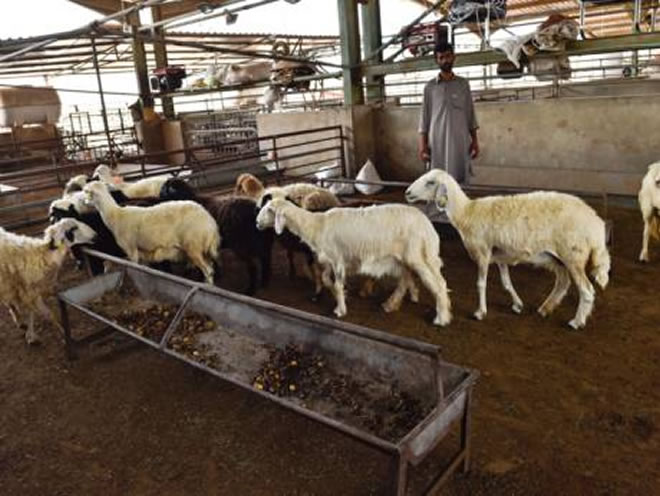
Sunday, September 04, 2016

Local livestock available in a sheds as traders wait for fresh stock before Eid at Cattle market in Al Qusais.
Dubai/Abu Dhabi/Sharjah: The monsoon ban on export of livestock by the Indian government is having an adverse impact on the UAE cattle market ahead of Eid Al Adha, traders told Gulf News.
With only a week to go for Eid Al Adha, the cattle markets in Dubai, Sharjah and Abu Dhabi are facing a shortage of sacrificial animals.
Beginning on September 12 this year, the festival of Eid Al Adha is marked by sacrificing animals such as goats, sheep, cows, bulls and camels.
Traders at Al Ghusais Cattle Market on Sunday said most buyers prefer Indian goats and sheep for sacrifice, and this year the shipments from India have been delayed due to an annual three-month ban which was lifted on September 1.
“Every year, we receive the stock around two weeks before Eid, but this year with just a week to go we are still waiting. The stock is on the way and we are expecting to receive the animals either on Monday or Tuesday,” said Mureed Hussain, a trader who has been in the business for 30 years.
Hussain said that the June 1 to August 31 ban is imposed every year, but this year it fell closer to Eid Al Adha.
“We hope it will not impact our business much. This is the time we make most of our business and survive all year on this. I have ordered 2,000 goats and sheep, but the later they arrive, the shorter the time we will have to sell the stock. If I am unable to sell the stock by Eid, I will lose money as the prices will drop after Eid,” Hussain added.
With restrictions on Iranian and Somali stock as well as a Pakistani government ban on export of its livestock, the arrival of Indian livestock has become vital.
Riyaz Ahmad, a Pakistani trader, said limited quanitities of Somali livestock arrived late due to an illness found in the animals.
“I usuallly have a mix of stock, including Somali, local as well as Indian. The local stock is always limited and expensive. This year the Somali stock is also not readily available and that makes us all the more reliable on the Indian imports,” said Ahmad, who is waiting for his order of 400 goats.
Unlike Hussain and Ahmad, who have pinned all their hopes on the Indian stock, Moosa Khan has managed to procure Somali goats and ram via Qatar.
“I bought around 800 Somali goats and rams through a local trader from Qatar in the hope that I will get some early business but so far it has been disappointing. Due to limited availability the cost is high but the customers are asking for half the price. This is the main season for us and if we don’t make enough now then we will struggle to survive throughout the year.”
The scene is not very different in the sheds selling bulls, with only limited stock available from Somalia.
In Abu Dhabi, traders said they are still waiting for their Indian livestock to arrive, which is expected to reach by Monday.
“We have been informed that the livestock from India will arrive by Monday and so we are just waiting and hoping that this is the case because we are a bit short at the moment [in the number of sacrificial animals],” said Sabah Khan, a livestock dealer.
“At the moment I have around 20 ram from the UAE, Saudi Arabia, and Syria — the number of ram I am expecting from India numbers at least 100 so it will make a big difference for me once they arrive,” he added.
Another dealer, Mohammad Khan, said all of his current livestock was from Arab countries, including the UAE. “I have no Indian livestock at the moment and I am waiting for them to arrive which will definitely help with business as they contribute a large portion of the sacrificial animals that are requested,” he said.
According to traders the situation could get worse next year when Eid Al Adha will fall in August and Indian stock may not arrive in time due to the monsoon ban.